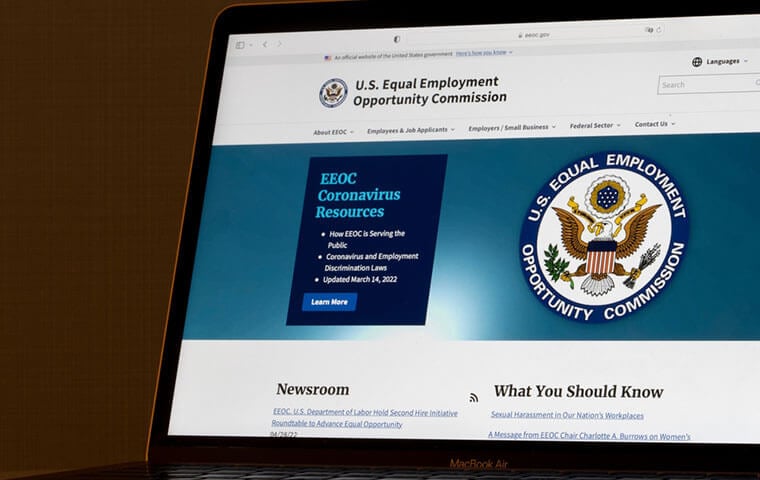 EEOC: The Department of Justice’s OLC opinions constitute controlling legal advice to Executive Branch officials which the EEOC must follow. Image: Tada Images/Shutterstock.com
By: FEDweek Staff
EEOC: The Department of Justice’s OLC opinions constitute controlling legal advice to Executive Branch officials which the EEOC must follow. Image: Tada Images/Shutterstock.com
By: FEDweek StaffFollowing are two new memos to agencies in which the EEOC said it will stop levying monetary penalties against federal agencies for not complying with its orders and emphasizing that a presumption of innocence applies to officials who have been accused of workplace EEO violations and saying they should not be disciplined without “a substantive finding of misconduct based on objective and credible evidence.”
Ending Unauthorized Monetary Sanctions Against Federal Agencies
Historically, the EEOC has taken the position that it may impose monetary sanctions, including attorney’s fees and costs, against federal agencies who fail to comply with the EEOC’s orders in administrative proceedings. In taking this position, the EEOC has disregarded for the past two decades the advice of the Department of Justice’s Office of Legal Counsel (OLC) that EEOC may not impose such sanctions. That ends today. The Department of Justice’s OLC opinions constitute controlling legal advice to Executive Branch officials which the EEOC must follow. On my watch, the EEOC will do so going forward. Similarly, the EEOC will recognize that questions of statutory construction—including questions regarding the parameters of the EEOC’s authority—are ultimately decided by the courts.
The EEOC is further bound by OLC’s opinion because it is consistent with the federal courts’ firmly established jurisprudence on sovereign immunity. The Supreme Court has long held the United States immune from suit for money damages, such as sanctions, unless it has consented to be sued, or unless a waiver is expressly created by federal statute. Statutes waiving sovereign immunity are “strictly construed … in favor of the sovereign,” and a “waiver of sovereign immunity cannot be implied but must be unequivocally expressed.” The doctrine of sovereign immunity applies to suits in which the United States is the named defendant as well as to suits, such as an EEOC administrative proceeding, in which a federal agency or its officials are the named defendants.
These bedrock principles apply just as forcefully in the EEOC’s administrative complaint process as they do in federal court. Among the various circuits, only the Ninth has squarely addressed whether the EEOC’s enabling statutes grant it the authority to impose monetary sanctions against federal agencies. The answer from the Ninth Circuit was a straightforward no. The EEOC fully agrees that Congress has not waived sovereign immunity with respect to monetary sanctions against federal agencies appearing before the EEOC.
Accordingly, I direct that the EEOC will no longer impose monetary sanctions against federal agencies. The EEOC will continue to protect the integrity of its proceedings through the other powerful tools at its disposal, such as resolving contested issues in favor of an opposing party, drawing adverse evidentiary inferences, excluding evidence, or taking other appropriately tailored action. Prudent use of these tools, rather than resorting to monetary sanctions, will further the EEOC’s mission of eliminating unlawful discrimination while responsibly stewarding the funds entrusted to the federal government by Congress.
Consistent with this memorandum, any prior EEOC memoranda, procedures, or other documents that conflict with the above are hereby withdrawn.
Restoring and Protecting the Presumption of Innocence in the EEO Complaint Process
Recently, the United States Department of Defense initiated a review of its practice to hold in abeyance promotions of employees, including uniformed personnel, when there is a pending equal employment opportunity (EEO) complaint against them. The EEOC fully supports the Department of Defense’s effort to abandon this practice and provide relief to those adversely affected by it.
Neutrality is a core pillar of the federal sector EEO process. This means an employer may not punish an employee who in good faith files a complaint or otherwise participates in the EEO process. This also means there is never a presumption of guilt against someone accused of unlawful discrimination. The burden of proving unlawful discrimination always falls on the party making the allegation. Any effort to reflexively punish an employee—formally or informally—simply for being accused of unlawful discrimination undermines the integrity of the entire EEO process.
It is also the EEOC’s view that a presumption of innocence for the accused furthers the truth-finding goal at the heart of the EEO process. In service of this truth-finding goal, the anti retaliation laws prohibit agencies from taking adverse actions against those who in good faith cooperate with investigations and related EEO proceedings. These protections extend to the accused employee as well, and the accused employee who is presumed innocent will be far more likely to actively and productively participate in the truth-finding process than one presumed guilty from the start.
All federal agencies should review their EEO programs to ensure true neutrality for both accuser and accused. No federal agency should punish an employee—including by withholding or delaying promotions—for being the subject of an EEO complaint without a substantive finding of misconduct based on objective and credible evidence.
For our part, the EEOC renews our commitment to the shared vision of a federal workplace that is both guided by merit-based principles and free from unlawful discrimination. My office is actively working to reform the federal sector EEO process to more fully meet these complementary goals. I recognize that for many complainants and agencies, the EEO process has ossified and become unduly slow, erratic, and painful. We can, and very swiftly will, do better.
OPM Details Coverage Changes, Plan Dropouts for FEHB/PSHB in 2026
Does My FEHB/PSHB Plan Stack Up? Here’s How to Tell
2025 TSP Rollercoaster and the G Fund Merry-go-Round
5 Steps to Protect Your Federal Job During the Shutdown
Primer: Early out, buyout, reduction in force (RIF)
See also,
OPM Guidance Addresses Pay Issues arising During, After Shutdown

